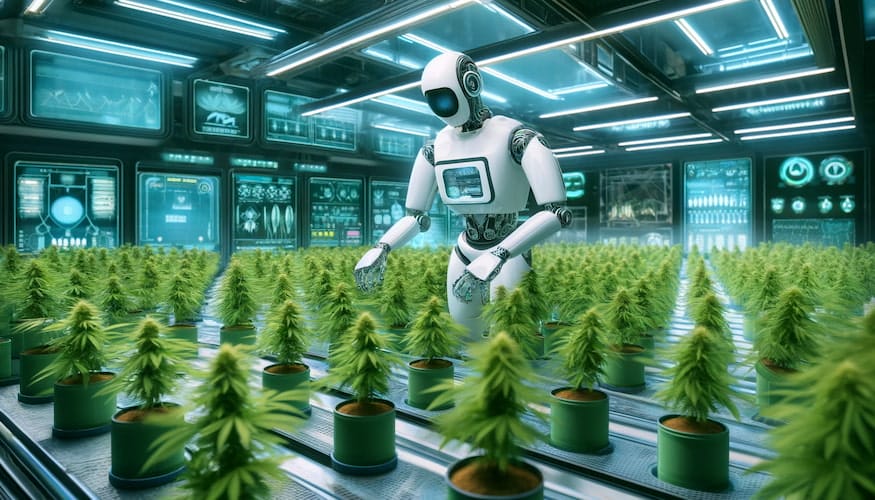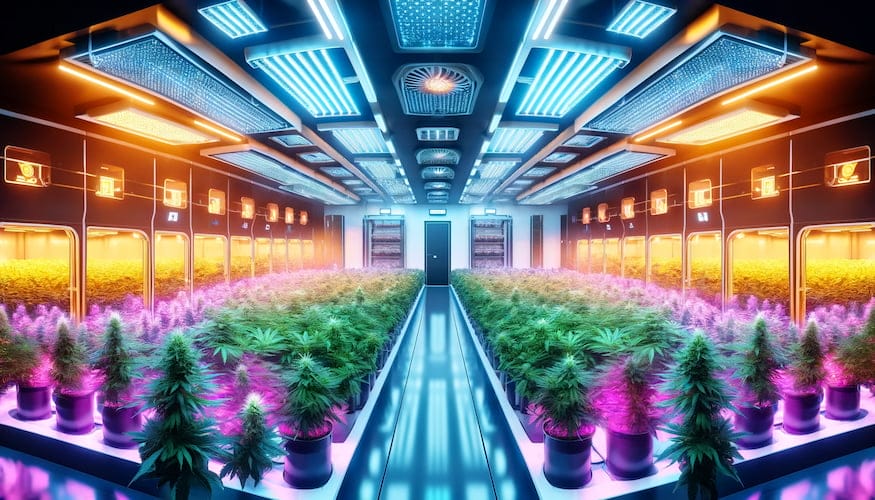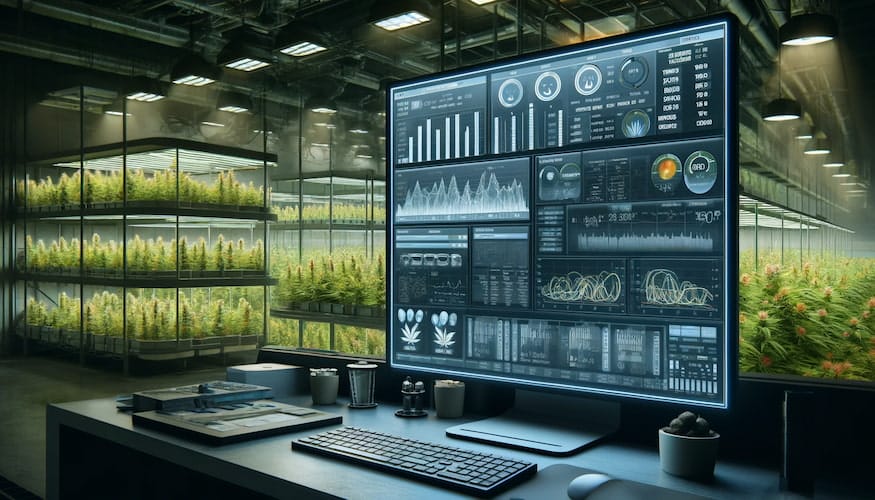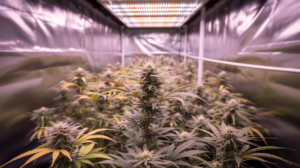AI and Cannabis: Revolutionizing Cultivation

Introduction to AI in Agriculture
The integration of Artificial Intelligence (AI) into agriculture is no longer a futuristic concept but a transformative reality. In the realm of agriculture, AI’s potential to optimize processes, maximize yields, and sustain environmental resources is unparalleled. This is especially pertinent in specialized sectors such as cannabis cultivation, where precision and efficiency are paramount. As we explore the intersection of AI and cannabis cultivation, we’ll uncover how technology not only drives plant health but also sets the stage for revolutionary changes in the marijuana industry.
Overview of AI Technologies
AI encompasses a broad array of technologies, including machine learning, neural networks, and computer vision. Each plays a critical role in agriculture by enabling more informed decision-making and automation. Machine learning algorithms can predict crop productivity and health, neural networks can process vast amounts of data to optimize growth conditions, and computer vision can monitor plant development and detect anomalies. Understanding these technologies is essential for grasping their potential impact on cannabis cultivation.
Significance of AI in Modern Farming
AI’s impact on agriculture extends beyond automating tasks—it transforms how farms operate. By analyzing data on weather patterns, soil conditions, and plant health, AI enables farmers to make decisions that increase crop yields and reduce waste. This shift is crucial in cannabis cultivation, where specific strains require carefully controlled environments. AI’s ability to precisely manage these conditions helps ensure the consistent quality and potency of cannabis products.

The Emergence of AI in Cannabis Cultivation
The cannabis industry is uniquely positioned to benefit from AI due to its rapid growth and the stringent regulations surrounding its production. Early adopters of AI in cannabis cultivation are setting benchmarks for efficiency and productivity. These innovators use AI to navigate complex regulatory landscapes, optimize growing conditions, and streamline the supply chain, from seed to sale.
Pioneering AI Solutions in Cannabis Farming
Innovative AI solutions are being deployed across cannabis farms to address various challenges. For example, AI-powered drones and sensors collect and analyze data to monitor plant health and soil moisture levels. Automated lighting and irrigation systems adjust in real time to create the ideal growing conditions. These technologies not only improve operational efficiency but also enhance the quality of the cannabis produced.
Case Studies of AI Adoption
Several successful case studies illustrate the benefits of AI in cannabis cultivation:
- Predictive Cultivation: A California-based cannabis company uses predictive analytics to forecast optimal planting and harvesting times, significantly increasing their yield per acre.
- Disease Detection: An AI application developed for detecting early signs of plant disease has reduced crop losses by over 20 percent on a cannabis farm in Colorado.
- Automated Harvesting: Robotics equipped with AI have been implemented in Canadian cannabis greenhouses to automate the harvesting process, reducing labor costs and minimizing plant handling damage.
Key AI Technologies Transforming Cannabis Cultivation
AI technologies such as predictive analytics, automated systems, and the Internet of Things (IoT) are at the forefront of modernizing cannabis farming.
Predictive Analytics
This technology harnesses historical data and AI algorithms to predict future outcomes in crop management. In cannabis cultivation, predictive analytics can foresee potential pest attacks or disease outbreaks, allowing preemptive measures to be taken before they impact yield.
Automated Systems and Robotics
Automation in cannabis cultivation ranges from robotic arms used for planting and trimming to fully automated environmental control systems. These systems manage everything from humidity to nutrient levels, significantly reducing the reliance on human labor while enhancing the consistency of the growing conditions.
IoT and Real-Time Monitoring
IoT technology connects sensors throughout the cannabis farm to a central system that monitors everything in real time. This setup allows for the automatic adjustment of conditions to maintain the optimal growth environment, thereby ensuring high-quality cannabis production.

Benefits of AI in Cannabis Cultivation
Artificial Intelligence (AI) is rapidly becoming a game-changer in the cannabis industry, offering numerous advantages that not only improve operational efficiencies but also enhance product quality and sustainability. Here’s a detailed exploration of the primary benefits of integrating AI into cannabis cultivation:
Increased Yield and Quality
AI plays a pivotal role in optimizing the various environmental factors that contribute to the growth and health of cannabis plants. Through the use of sophisticated algorithms, AI systems are capable of analyzing vast amounts of data from sensors monitoring light, temperature, humidity, and CO2 levels. This data helps in creating the perfect growth conditions tailored to specific strains of cannabis, which can significantly differ in their environmental needs.
Precision Agriculture: AI facilitates precision agriculture in cannabis farming, allowing for meticulous control over the growing conditions. By adjusting parameters such as light schedules based on the plant’s growth stage, AI ensures that cannabis plants receive optimal light wavelengths, which is crucial for their development.
Health Monitoring and Disease Prevention: AI-driven systems can detect subtle changes in plant health before they become visible to the human eye. By employing image recognition and predictive analytics, these systems can identify signs of stress, nutrient deficiencies, or disease in plants. Early detection enables growers to take corrective actions promptly, preventing widespread crop damage and ensuring the cultivation of healthy plants with higher cannabinoid levels.
Reduced Costs and Environmental Impact
AI’s ability to streamline and optimize resource use significantly reduces the operational costs and environmental footprint of cannabis cultivation.
Smart Water Management: Water is a critical resource in cannabis cultivation, and its overuse can lead to significant environmental and financial costs. AI-powered irrigation systems can intelligently adjust water usage based on the moisture content of the soil and the specific hydration needs of the cannabis plants. This precision not only conserves water but also prevents the leaching of nutrients from the soil, reducing the need for additional fertilization and minimizing runoff pollution.
Energy Optimization: Cannabis cultivation, especially in indoor settings, can consume a large amount of energy due to lighting and climate control systems. AI optimizes the use of these systems, ensuring they operate only when necessary and at optimal levels, thereby reducing electricity consumption. For instance, AI can manage the operation of LED grow lights and HVAC systems based on the time of day and external weather conditions, ensuring energy efficiency without compromising plant growth.
Enhanced Regulatory Compliance
The cannabis industry faces stringent regulatory requirements that can vary significantly from one region to another. Non-compliance can result in severe penalties, including fines and operational shutdowns. AI can help ensure that cultivation operations adhere to all regulatory standards effectively.
Automated Record-Keeping: AI systems can automate the tracking and recording of all cultivation activities, ensuring accurate and timely documentation that can be critical during inspections. This includes logs of pesticide applications, nutrient use, and harvest data, which are essential for maintaining compliance with safety and quality standards.
Traceability from Seed to Sale: AI facilitates comprehensive traceability in the cannabis supply chain. From seed germination to the final product reaching the consumer, every step can be monitored and recorded. This not only helps in meeting regulatory requirements but also boosts consumer confidence in the quality and safety of the product.
By integrating AI into their operations, cannabis cultivators can achieve higher yields and product quality, reduce operational costs and environmental impacts, and ensure compliance with complex regulatory frameworks. As the cannabis industry continues to evolve, the role of AI is expected to expand further, bringing more sophisticated solutions to meet the challenges of modern cannabis cultivation.
AI and Cannabis: Challenges and Considerations
While AI offers numerous advantages for cannabis cultivation, several challenges and considerations must be addressed to fully harness its potential. Below are some key issues associated with the integration of AI in this field:
High Initial Investment Costs
Implementing AI technology often requires significant capital investment. The costs include not only the hardware, such as sensors and automated systems, but also software development, system integration, and ongoing maintenance. For many cannabis operations, particularly smaller enterprises or startups, these upfront costs can be prohibitive, potentially delaying or deterring the adoption of AI technologies.
Complexity of Integration
Integrating AI with existing agricultural systems can be a complex task, especially if the existing infrastructure is outdated or not compatible with new technologies. The integration process may involve extensive modifications to current practices and systems, requiring skilled professionals who understand both AI and cannabis cultivation. This complexity can lead to longer implementation times and increased costs.
Data Security and Privacy Concerns
With the implementation of AI, cannabis cultivation operations generate large volumes of data, some of which can be sensitive, such as detailed production techniques or proprietary strain information. Protecting this data against breaches is critical, as cyber threats become more sophisticated. Additionally, there may be privacy concerns regarding the collection and use of data, especially when it pertains to compliance with regulations and sharing information with government bodies.
Reliance on Technology
Heavy reliance on AI can also make cannabis cultivation vulnerable to technical failures and system malfunctions. Ensuring that there are adequate backup systems and fail-safes in place is crucial to mitigate any potential disruptions that could lead to crop loss or other operational setbacks.
The AI Skill Gap
There is a skill gap in the labor market when it comes to operating AI-driven systems, which requires personnel who are not only skilled in technology but also understand the nuances of cannabis cultivation. Training existing employees or hiring new talent with the necessary expertise can be an additional challenge and cost for cannabis businesses.
Addressing these challenges requires careful planning, robust investment in both technology and human resources and a proactive approach to security and privacy issues. Despite these hurdles, the strategic integration of AI can lead to substantial benefits, making it a worthwhile consideration for cannabis cultivators aiming to enhance their competitive edge and operational efficiency.

Future Trends in AI and Cannabis Cultivation
The future of AI in cannabis cultivation looks promising, with trends pointing towards more advanced machine learning models and increased automation. Innovations in AI will likely focus on further improving efficiency and personalizing cannabis products to meet specific therapeutic needs.
AI and Cannabis: Conclusion
AI’s role in revolutionizing cannabis cultivation is undeniable. As technology advances, its integration into cannabis farming promises not only to enhance efficiency and yield but also to reshape the entire industry. The potential of AI to meet the growing demands of the cannabis market while addressing sustainability concerns illustrates its critical importance in the future of agriculture.
Now that you understand the pros and cons of AI for cannabis cultivation, shop the collection of regular, feminized, and autoflower cannabis seeds at Seeds Here Now.
Looking for other innovative technologies to improve your grow game? Check out our article on VR and Cannabis Cultivation.
Suggested Articles
;)
;)
;)




 11 Jul 2025
11 Jul 2025  4 min read
4 min read


 April 16, 2024
April 16, 2024 


RESPONSES (0)
No responses yet. Be the first to respond!